- Home
- Health
- Water Softener Guide
- Water Treatment
Private Sewers & Septic Systems
- About Private Sewers Sysytem And Septic Systems
- Lateral Root Notification Program
- Fats, Oil & Grease
- Spills & Black Water Valves
- Help Protect The Enviroment
- Septic Systems
- About
The Lowdown on Distilled Water: Advantages Explored
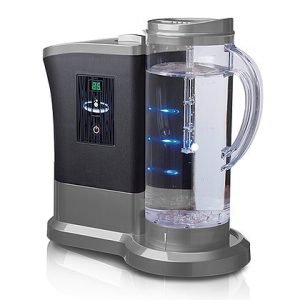
Are you taking part in the recent push for hydration, upping your water intake? But here’s a query for you: exactly what type of water fills your glass?
Dive into the realm of distilled water. Is it the elixir you’ve embraced? While many tout its benefits, some caution about its drawbacks. Let’s demystify this beverage and get to the heart of its value.
1. Distilled Water vs. Tap Water
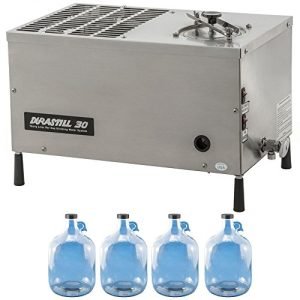 Tap water has often been scrutinized for its potential health risks. Texas A&M, for instance, linked nitrite pollution in tap water to birth defects. The University of Rochester Medical Center, in 2007, spotlighted copper in tap water as a possible Alzheimer’s Disease catalyst. While most tap water is deemed safe, these examples demonstrate that lurking risks can be present. Distilled water sidesteps these risks entirely. Why? Because it’s entirely pure, rid of all harmful contaminants.
Tap water has often been scrutinized for its potential health risks. Texas A&M, for instance, linked nitrite pollution in tap water to birth defects. The University of Rochester Medical Center, in 2007, spotlighted copper in tap water as a possible Alzheimer’s Disease catalyst. While most tap water is deemed safe, these examples demonstrate that lurking risks can be present. Distilled water sidesteps these risks entirely. Why? Because it’s entirely pure, rid of all harmful contaminants.
2. A Pure, Natural Process
Ever wondered about the mechanics of creating distilled water? It’s akin to nature’s water cycle. Essentially, it’s water boiled and then condensed, collecting the clean vapor. This process effectively removes bacteria and contaminants. No need for expensive filters or chemicals. You can even emulate this process in the comfort of your kitchen.
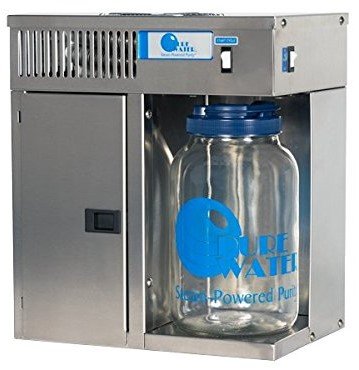
3. Purity at Its Peak
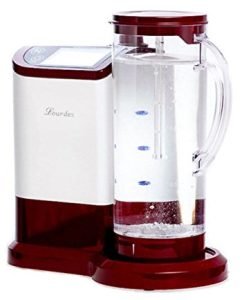
When purity is paramount, distilled water shines brightest. It’s the choice of various industries, from laboratories to food processing units, due to its unparalleled purity. So if you’re focused on water quality, especially during health vulnerabilities, distilled water is the gold standard.
4. An Uncompromised Beverage
Chlorine and fluoride often find their way into our tap water, with the latter primarily used to combat bacteria in pools. Such treatments, while beneficial for sanitation, introduce unwanted chemicals to your drinking water. Distilled water? It presents a crystal-clear alternative – literally.
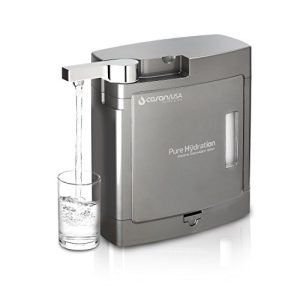
5. Shield Against Water Borne Threats
It’s no secret that water can be a medium for various diseases. But the distilled variety guarantees safety from these threats, making it an ideal choice for health-conscious individuals.
6. A Blank Slate for Your Body
 Distilled water could be instrumental in body detoxification. Even if we put the detox claims aside, distilled water, with its “empty” composition, ensures it’s only hydrating, not complicating, your system.
Distilled water could be instrumental in body detoxification. Even if we put the detox claims aside, distilled water, with its “empty” composition, ensures it’s only hydrating, not complicating, your system.
7. Zero Unwanted Minerals
Here’s a common misconception: distilled water leaches essential minerals from your body. But let’s be clear. Most minerals your body requires are sourced from your diet. Distilled water simply bypasses inorganic minerals found in some tap waters – the kind we could do without.
8. A Cost-conscious Choice
Consider this: purchasing a 500ml water bottle might set you back by $1. But a distilled water machine? Over time, it could bring your cost per gallon down to just a few cents. Non-electric counter-top distillers offer another affordable avenue. It’s hydration without the hole in your pocket.
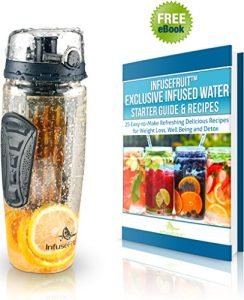
9. Distilled vs. Spring Water: The Debate
The bottled water aisle is buzzing with the distilled vs. spring water debate. Many are lured by the allure of spring water, imagining pristine mountain streams. However, studies reveal that some bottled “spring water” may contain harmful contaminants or even be as masquerading as tap water. Distilled water, thanks to its rigorous purification process, stands as a genuine beacon of purity.
10. Distilled Water’s Vast Applications
The applications of distilled water extend beyond quenching thirst. Whether it’s in the realm of medicine, automotive cooling systems, or even laundry, its unparalleled purity makes it a versatile choice.
"Understanding the Potential Dangers of Distilled Water: A Detailed Exploration"
1. Absence of Essential Minerals:

- Distilled water undergoes a process that strips it of all contents, including potentially harmful contaminants, but also essential minerals such as chloride, potassium, and magnesium.
- The human body requires these minerals for various physiological functions. Water sources like those filtered with reverse osmosis retain these beneficial minerals, while distilled water does not. There’s a concern that consuming water devoid of these minerals might deprive the body of essential nutrients.
2. Time Intensive Production:
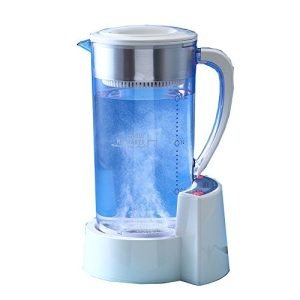
Producing distilled water, particularly at home, can be a lengthy process. Depending on the specific equipment used, it can take around 7 hours or more to distill water.
Modern distillers might have features like auto shut-off, but those in need of quicker solutions might have to invest in premium, faster distillation machines or alternative water filtration methods.
3. Energy Efficiency Concerns:
- Distillation, given its duration, can be energy-intensive. This not only has environmental implications but can also significantly increase one’s electricity bills.
- Those concerned about energy usage could explore non-electric distillers or other energy-efficient water filtration systems.
4. Precision is Key:
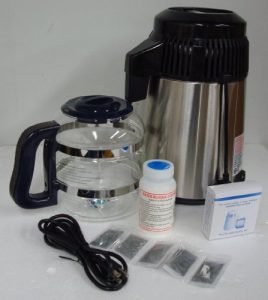
- Distilling water requires very specific conditions, especially the correct boiling temperature, to ensure the effective removal of harmful contaminants.
- In DIY setups, there’s always the risk of missing a step or not maintaining the required conditions, leading to potential retention of unwanted elements such as chlorine, herbicides, and volatile organic chemicals.
5. High Equipment Costs:
- For those who do not wish to distill water at home, the alternative is purchasing pre-distilled water, which can be both costly and environmentally unfriendly due to packaging.
- Home water distillers, while eliminating the need for purchasing water, can be an investment with prices reaching up to $900. However, non-electric variants can offer savings in terms of reduced electricity bills.
6. Flat Taste Profile:
One common feedback regarding distilled water is its “flat” taste. This taste, or lack thereof, arises because distilled water is entirely pure, free from contaminants and minerals alike.
While other water sources might retain a more natural taste due to minerals, they might also carry bacteria or pathogens that distilled water won’t.
7. Potential for Material Leaching:
The intensive boiling inherent to the distillation process poses risks if done in containers that can dissolve or leach materials, like certain plastics.
This could introduce unwanted flavors to the water and even compromise its purity, depending on the container used.
8. Perceptions of Unnaturalness:
Some critics argue that distilled water, given its rigorous purification process, isn’t “natural,” especially when compared to spring water which flows directly from natural sources.
While the distillation process is scientific, it doesn’t necessarily render the water “unnatural.” It merely ensures its purity.
Benefits of Distilled Water:
Unmatched Purity: Distilled water is one of the purest forms of drinking water. Anything labeled as distilled has undergone rigorous purification, guaranteeing its cleanliness.
Transparency over Bottled Water: Many bottled water brands source from taps, despite their marketing rhetoric. Terms like “spring” or “mineral” can be misleading. With distilled water, there’s clarity about its purity.
Safety over Tap Water: An alarming amount of pollutants, including radioactive waste and various chemicals, find their way into our environment annually. Some of these end up in our water supply, posing risks that are sometimes not even actively monitored by agencies like the EPA. Distilled water provides a safe and clean alternative.
Conclusion
In conclusion, while distilled water offers unparalleled purity, there are considerations in terms of production, costs, and taste. Individuals must weigh these factors based on their personal preferences, health needs, and circumstances.
Scientific Reference
- Hegarty CP, Rahn O. Growth Retardation by Freshly Distilled Water. Journal of Bacteriology. 1934;28(1):21-30.
- Popkin, Barry M., Kristen E. D’Anci, and Irwin H. Rosenberg. “Water, Hydration and Health.” Nutrition reviews 68.8 (2010): 439–458. PMC. Web. 24 Dec. 2017.
- Measurement of pH of distilled water Hubert L. Youmans J. Chem. Educ., 1972, 49 (6), p 429DOI: 10.1021/ed049p429Publication Date: June 1972
- NAS (National Academy of Sciences) 1980 National Research Council: drinking water and health vol 2 (National Academy Press, Washington, DC)
- Stoddard L, J Abiecunas and R O’Connell 2006 Economic, Energy, and Environmental Benefits of Concentrating Solar Power April
- Gregory, J Cryptosporidium in Water: Treatment and Monitoring Methods (Filtration & Separation)








